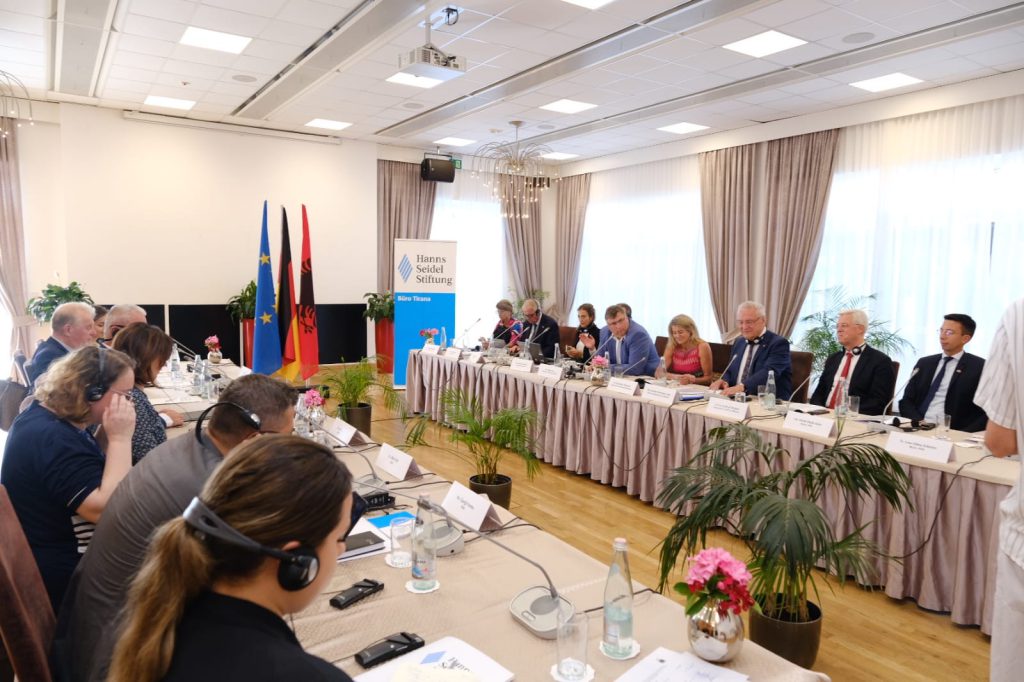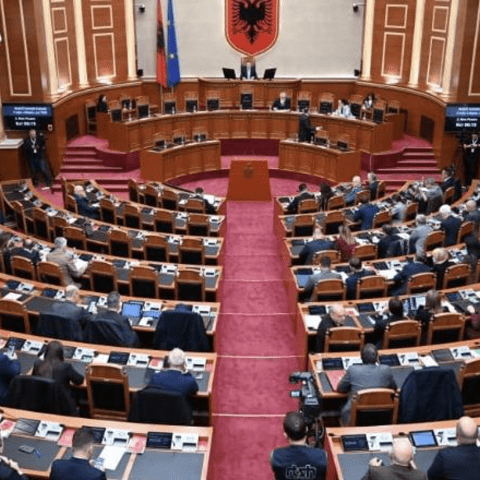TIRANA, Aug. 7, 2024 – Representatives of the Albanian Institute for International Studies (AIIS) participated in a meeting where Bavarian Interior Minister Joachim Herrmann discussed key issues with Albanian civil society representatives and other actors.
Accompanied by a delegation, the interior minister of Germany’s wealthiest and largest-by-area federative state had earlier met with Prime Minister Edi Rama and Albanian government members during his stay in Tirana.
AIIS Chairman Albert Rakipi emphasized the importance of exchanging ideas with various actors, including research centers and civil society organizations, a practice not commonly seen with high-ranking European officials visiting Albania. AIIS and Bavaria-based Hanns Seidel Foundation have a consolidated relationship, conducting numerous relevant projects on international relations, security, migration and foreign policy in the Western Balkans.
“Albania’s relations with Germany are crucial,” Rakipi said. “But with Bavaria, they are even more special, recalling the visits of the late Bavarian Prime Minister Franz Josef Strauss in the 1980s. Strauss’s visits were an invitation for Albania to open up to the West through Bavaria, which was rejected by the communist regime in Tirana. This moment remains marked in history as a missed German opportunity for Albania.”
Minister Herrmann praised the Hanns Seidel Foundation for its role in fostering relations between Bavaria and Albania, particularly its office in Tirana, which has been active since 1992.
“Mr. Rakipi, you reminded us of Franz Josef Strauss’s visits to Albania. During our visit with Prime Minister Rama, I recalled working as a young civil servant in Strauss’s State Chancellery in Munich in the 1980s. These visits, as Prime Minister Rama mentioned during the visit of our Prime Minister Markus Söder last year, are still the basis of a ‘special relationship’ with Bavaria,” Herrmann said.
Albania is now a member of many international organizations, and Bavaria supports Albania’s swift accession to the European Union.
“The friendship between Albania and Bavaria has a good tradition. There are at least 17 branches of Bavarian companies in Albania, with a tendency to expand,” Herrmann said.
Last year, the Bavarian Business Association opened an office in Tirana, focusing on implementing language and professional training programs, expanding business contacts, and recruiting qualified Albanian workers for the Bavarian labor market.
The founding meeting of the Bavaria-Albania joint governmental commission in Tirana last July was crucial for consolidating and expanding the growing partnership between Bavaria and Albania.
“Bavaria is also interesting to many Albanians. Currently, about 16,000 Albanians live in Bavaria, many of whom are students. The Otto Friedrich University of Bamberg and the Ludwig Maximilian University in Munich have special collaborations with universities in Albania,” Herrmann noted.
Moreover, Interior Minister Herrmann highlighted the importance of deepening security cooperation.
“We have had good cooperation for several years, but it can be further developed. We want to maintain the friendship, expand economic relations and enhance security cooperation,” he said.
Also present at the meeting, former Deputy Prime Minister and main opposition Democratic Party representative Genc Pollo discussed Albania’s internal political situation, stating that the democratic system has been deteriorating towards an autocratic and kleptocratic regime.
“Parliamentary and local elections are increasingly less free and fair, as shown by international monitoring. The ruling party massively and illegally uses the public administration, engages in vote-buying, and involves criminal groups. The media is increasingly controlled by the government, and the separation of powers and democratic checks and balances have long been eroding. Power is concentrated and personalized in the hands of the head of government, and mega-corruption scandals have engulfed the top of the government,” Pollo said.
AIIS Chairman Rakipi noted that issues related to a functioning democracy are fundamental and start with allowing free and fair competition in all areas.
“Building a democratic society and a market economy is paradoxical without competition. There is practically no competition in politics, within political parties and government, in the public administration, economy, media or academia. In a NATO member country aspiring for EU membership, elections with a single candidate, as happened with university leadership, cannot be conducted,” Rakipi said.
AIIS Executive Director Alba Cela focused on emigration concerns.
“In the last decade, Albania has lost about half a million inhabitants, according to the latest census, with a growing and consolidated trend of young people leaving the country,” Cela said.
German Ambassador Karl Bergner emphasized the importance Germany places on the Western Balkans, including through the Berlin Process.
“The tenth anniversary of the Berlin Process will serve as a reflection to accelerate the region’s European integration,” Ambassador Berger said.












